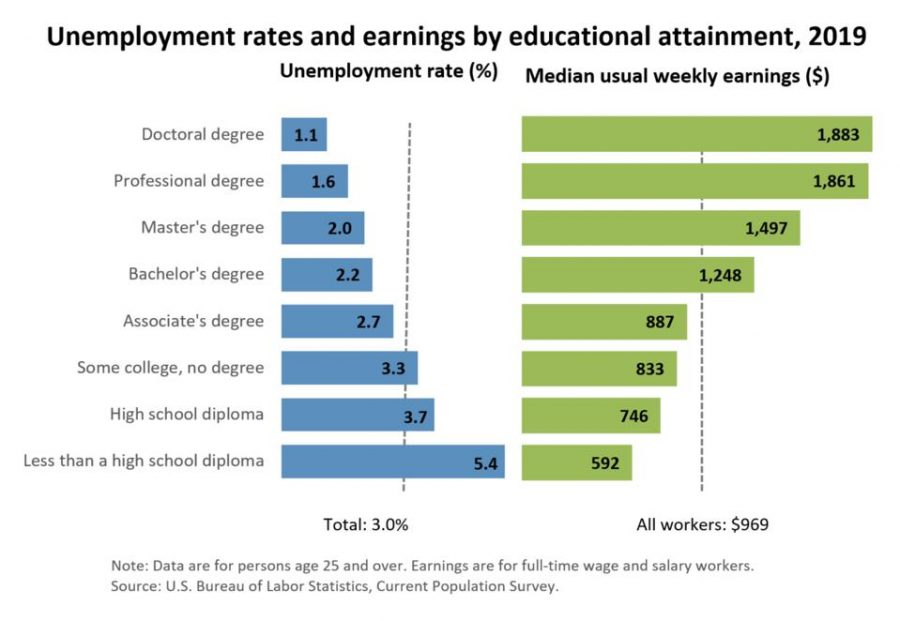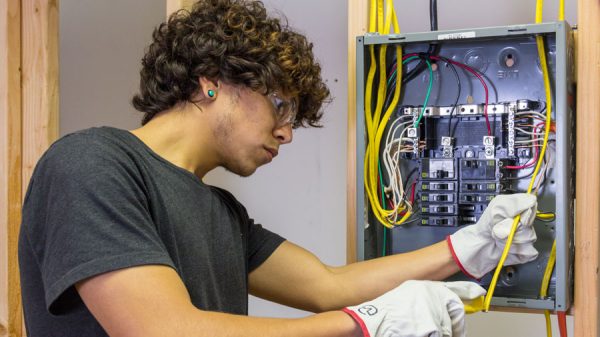College: is it still worth it?
Despite nerve-wracking sticker prices, a college education is worth every penny
Chart from forbes.com showing the difference in income and unemployment rates between high school and college grads.
February 8, 2021
As college application season draws to a close and acceptances start to trickle in, every family’s nightmare begins to materialize: how will they pay for it? With rising costs, it almost seems like the education isn’t worth hundreds of thousands of dollars. Is it true?
College is expensive, and the cost increases every year, leading many students and parents to wonder if it’s worth it. Despite the cost, a college education is valuable, sometimes essential, for success in our changing world.
College graduates have many advantages over non-college graduates in the job market, and not just because they have a better education. According to the U.S. Census Bureau Current Population Survey, unemployment for bachelor’s degree holders was 5.9% and high school graduates was 12% in January 2010. College graduates have less than half the unemployment rates as high school graduates, making their job security better. Additionally, the U.S. Census Bureau American Community Survey found that workers with a bachelor’s degree made an average of $56,000 a year, while workers with a high school degree made an average of $31,000 a year. The disparity is even greater between workers with some high school versus workers with a professional degree. Evidently, college graduates have many advantages with job stability and earnings over their counterparts.
Though college is expensive, sticker prices are rising because education is getting better and costing colleges more. In an interview with The New York Times, Shirley M. Tilghman, president of Princeton University, said, “When Princeton made the commitment to create a Genomics Institute, we did not turn around and cancel the department of classics.” College prices are rising because colleges are trying to keep up with all of the new discoveries and ideas, trying to give students a better education. Besides the education itself, the cost can include room and board, books and other amenities. It pays for the entire experience, and the price is not just an arbitrary figure.
RV counselor Lia Aloi said, “I also strongly feel that college is much more than an education. College was a liberating experience to begin to take responsibility for myself and my environment, while still having parental support.” Despite college’s educational purpose, it’s also a place where students can learn to make decisions for themselves and finally begin to experience the real world.
Additionally, families almost never pay the sticker price of college. In an interview with The New York Times, Molly Corbett Broad, president of the American Council on Education, said “Total student aid provided by institutions has more than doubled in the last decade, from $11.4 billion to $26.3 billion.” Though prices have risen, aid has increased even more dramatically.
Though college looks expensive, there are many other ways to reduce the cost and make it affordable. “College is expensive, but there are so many ways to cut down the cost of an education,” said Mrs. Aloi. “There are scholarships, jobs on campus, negotiating with the financial aid office and many other ways that will help reduce the cost of your education.” The sticker price shouldn’t scare students away from higher education.
A college education is valuable in today’s job market and helpful economically, intellectually and personally. Even with the financial constraints imposed by COVID-19, college is overall worth the investment because it will affect the rest of a student’s life.
Even with the financial constraints imposed by COVID-19, college is overall worth the investment because it will affect the rest of a student’s life.
Families can rest easily knowing that the money they spend now will improve a student’s life later on and pay for itself many times over.











